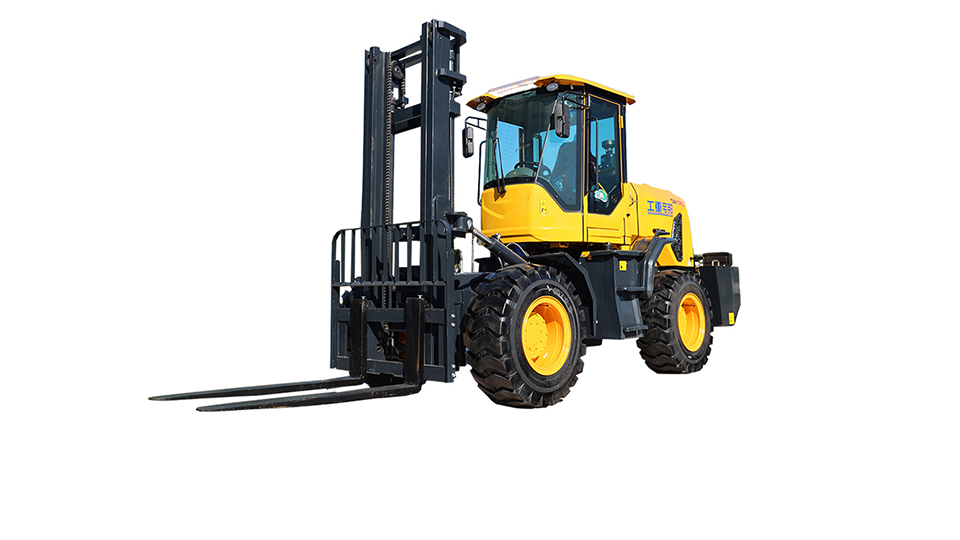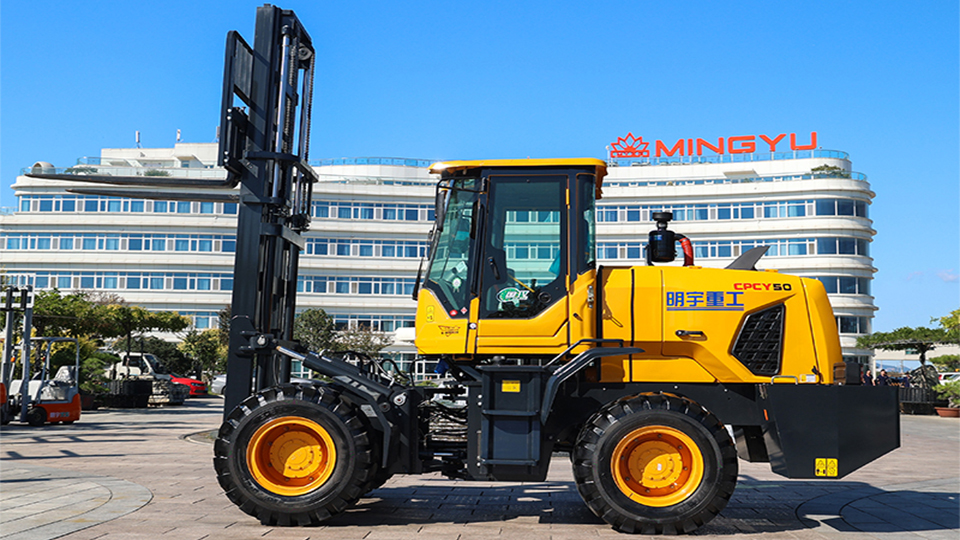
Off-road forklifts, also known as rough terrain forklifts, are specialized material handling machines designed to operate in challenging environments where conventional forklifts would struggle or fail. Their robust construction, powerful engines, and specialized tires make them indispensable in industries requiring heavy lifting and transportation across uneven, muddy, or otherwise difficult terrain. This article provides a comprehensive technical breakdown of the main uses of off-road forklifts, exploring their applications across various sectors.
Construction Sites: Navigating Unpredictable Terrain
Construction sites are notorious for their uneven surfaces, debris, and changing conditions. Off-road forklifts are crucial for several tasks:
Material Delivery and Placement: Transporting heavy construction materials like lumber, concrete blocks, steel beams, and pipes across the site. They can also position materials at elevated locations using their high-lift capabilities and load/unload trucks on uneven ground.
Site Preparation and Cleanup: Moving debris, excavated materials, and construction waste. They assist in leveling and grading surfaces and in the installation of temporary structures.
Foundation Work: Handling formwork and reinforcement materials, positioning concrete pours, and assisting in the installation of underground utilities.
Structural Erection: Lifting and placing structural steel components and supporting the installation of prefabricated building sections.
Forestry and Logging: Handling Heavy Timber in Remote Locations
The forestry industry demands equipment capable of operating in dense forests and rugged terrain. Off-road forklifts are essential for:
Log Handling: Loading and unloading logs onto trucks and trailers, sorting and stacking logs at lumber yards, and transporting logs within the forest.

Timber Processing: Moving lumber and timber products at sawmills and feeding logs into processing machinery.
Forest Management: Assisting in controlled burns and fire suppression, transporting equipment and supplies to remote locations, and clearing brush and debris.
Agriculture and Farming: Adapting to Diverse Field Conditions
Farms often feature uneven fields, muddy surfaces, and limited access. Off-road forklifts provide valuable support for:
Crop Handling: Transporting harvested crops like hay bales, pallets of produce, and bulk containers. They also assist in loading/unloading trucks and moving materials within barns and storage facilities.
Livestock Management: Handling feed and supplies, and moving livestock handling equipment.
Farm Maintenance: Transporting equipment and tools to remote fields, assisting in fence construction and repair, and moving irrigation equipment.
Orchard and Vineyard Operations: Moving bins of harvested fruit and assisting with pruning tasks.
Mining and Quarrying: Withstanding Harsh Environments
Mining and quarrying operations subject equipment to extreme conditions, including dust, rocks, and uneven surfaces. Off-road forklifts are critical for:
Material Transport: Moving ore, aggregates, and other materials within the mine or quarry, and loading/unloading trucks and railcars.
Equipment Maintenance: Transporting heavy equipment components and tools, and assisting in the repair and maintenance of mining machinery.
Site Preparation and Cleanup: Clearing debris and excavated materials, and leveling and grading surfaces.

Oil and Gas Industry: Operating in Remote and Hazardous Locations
The oil and gas industry often involves operations in remote and challenging environments. Off-road forklifts are used for:
Pipeline Construction and Maintenance: Transporting pipes and equipment, and assisting in pipeline installation and repair.
Drilling Operations: Moving drilling equipment and supplies, and handling pipe sections and other materials.
Site Maintenance: Transporting equipment and tools to remote locations and assisting in the maintenance of well sites and pipelines.
Emergency Response: Moving equipment during emergency situations.
Military and Defense: Supporting Operations in Diverse Terrain
Military operations often require equipment capable of operating in diverse and challenging terrain. Off-road forklifts are used for:
Logistics and Supply: Transporting supplies and equipment to forward operating bases, and loading/unloading cargo aircraft and vehicles.
Construction and Engineering: Assisting in the construction and maintenance of infrastructure, clearing debris and obstacles, and supporting disaster relief operations.
Ports and Shipping Yards: Handling Cargo in Outdoor Environments
Ports and shipping yards deal with large amounts of cargo in outdoor environments. Off-road forklifts are used for:
Container Handling: Moving shipping containers in storage yards and loading/unloading containers from trucks and railcars.
General Cargo Handling: Moving pallets, crates, and other cargo, and loading/unloading ships.
Technical Features Enabling Off-Road Performance
Several technical features contribute to the off-road capabilities of these forklifts:
Large, Pneumatic Tires: Provide increased traction and stability on uneven surfaces, and absorb shocks and vibrations.
Four-Wheel Drive (4WD): Provides enhanced traction and power distribution, enabling operation in muddy and slippery conditions.
High Ground Clearance: Allows the forklift to navigate obstacles and uneven terrain.
Powerful Engines: Provide sufficient power for lifting heavy loads and traversing difficult terrain. Diesel engines are common.
Robust Chassis and Frame: Provide durability and stability in harsh environments.
Heavy-Duty Suspension Systems: Absorb shocks and vibrations, improving operator comfort and stability.
Specialized Attachments: Allow for handling various types of loads and materials.
Conclusion
Off-road forklifts are indispensable tools in a wide range of industries, enabling efficient material handling in challenging environments. Their robust construction, powerful engines, and specialized features make them essential for construction, forestry, agriculture, mining, and other sectors. By understanding the specific applications and technical features of off-road forklifts, businesses can select the right equipment to optimize their operations and enhance productivity
Name: selena
Mobile:+86-13176910558
Tel:+86-0535-2090977
Whatsapp:8613181602336
Email:vip@mingyuforklift.com
Add:Xiaqiu Town, Laizhou, Yantai City, Shandong Province, China